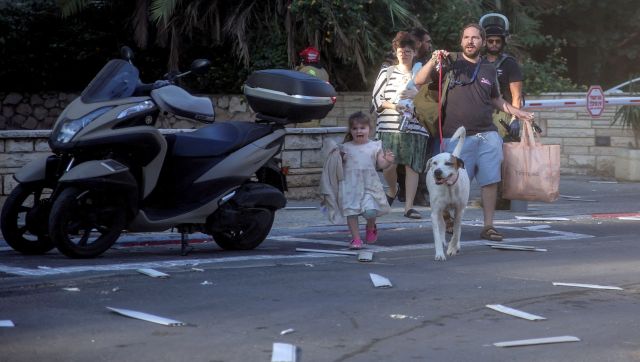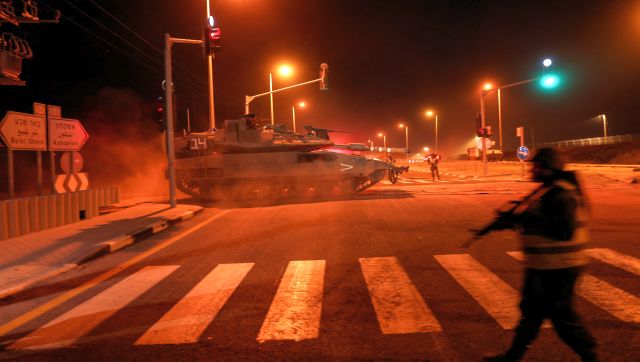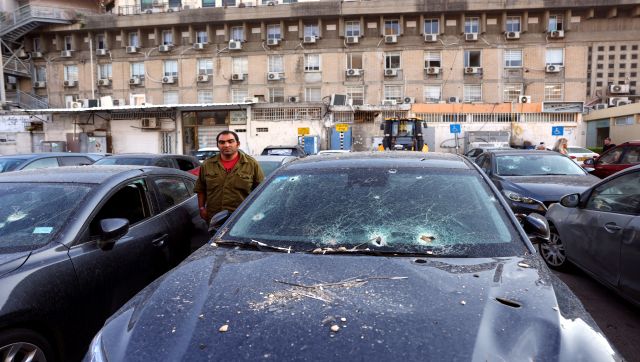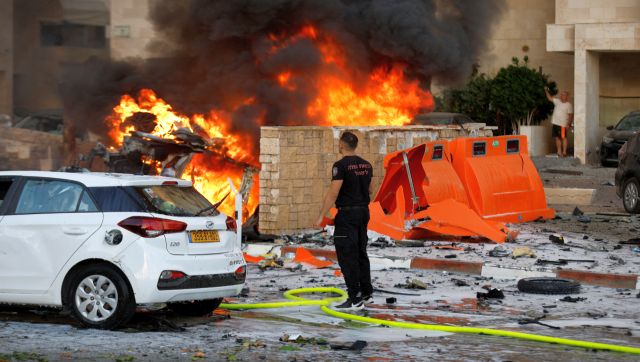It’s Day 10 of the Israel-Hamas war. The ongoing fierce airstrikes from both sides continue to claim an unprecedented number of lives. While the Israel side has already lost 1,300 lives, Palestinian authorities have announced that at last count the death toll stood at 2,750 in the Gaza Strip and another 9,700 others were injured. Philippe Lazzarini, the head of the United Nations Relief and Works Agency, said on Sunday of the unfolding situation: “Gaza is being strangled and it seems that the world right now has lost its humanity” adding an “unprecedented humanitarian catastrophe” was unfolding and warned “no place is safe in Gaza”. But apart from this catastrophic human disaster, the Israel-Hamas war has larger implications. The war will not only claim a disastrous human toll, but also have far-reaching effects on Israel’s economy, politics and social life. We take a deep dive and get you all the aspects – from the economic loss, to what this means for Israeli prime minister Benjamin Netanyahu and more. Israel’s economy The ongoing Israel-Hamas war is likely to impact Israel’s economy in the long run. There are also concerns about how a prolonged fight could weigh on the country’s economy. Consider this: Israel has called up 300,000 reservists for duty. These reservists are teachers, tech workers, startup entrepreneurs, farmers, attorneys, doctors, nurses, tourism and factory workers. As Eyal Winter, a professor of economics at Hebrew University in Jerusalem who has studied the economic impact of Israel’s wars, told CNBC, “The impact is substantial.” Bank Hapoalim, one of the largest banks in Israel, has already predicted that the cost of war between Israel and Hamas will cost the former NIS 27 billion (Rs 2.24 lakh crore), as per a Times of Israel report.
“At present time it can be assumed (in a very rough estimate) that the costs of the current war will amount to at least 1.5 per cent of GDP, which means an increase in the budget deficit of at least 1.5 per cent of GDP in the coming year,” Bank Hapoalim chief strategist Modi Shafrir was quoted as saying to Times of Israel. This estimate was drawn up on the basis of previous wars fought by Israel. For instance, the Second Lebanon War in 2006 cost Israel NIS 9.4 billion (Rs 78,272 crore) or 1.3 per cent of the GDP, according to the Institute for National Security Studies (INSS). The cost of Operation Cast Lead from December 2008 to January 2009 was estimated at NIS 3.3 billion (Rs 27,450 crore). The bank strategist added that the main impact would be felt in private consumption and tourism figures. However, the large mobilisation of the reserve forces will impact the economy even more. [caption id=“attachment_13255222” align=“alignnone” width=“640”] Israelis react on a street as rocket attacks are launched from the Gaza Strip, in Tel Aviv, Israel. Reuters[/caption] And the short-term effects of the war can already be seen in Israel. Tourism business has come to a near standstill. Cruise ships are avoiding Israel’s shores and major airlines have stopped flying to and from Israel. News agency Reuters has reported that Six Senses Shaharut and Hotel Indigo Tel Aviv have also shut down. Other hotels are also reporting cancellations, with Isrotel, one of Israel’s top chains, saying they were on the verge of temporarily closing. Moreover, the coming months were expected to see heavy footfalls owing to Christian pilgrimages. However, that too has been affected. Besides tourism, Israel’s ever-growing
tech industry
is also likely to be affected by the war. Winter said: “There will be a temporary hit for the startup industry.” Investors and analysts also predict that the war will derail the Israeli tech sector. Jon Medved, Chief Executive of OurCrowd, one of Israel’s largest venture capital firms, was quoted as telling Reuters, “Overseas investment will slow for the next couple of weeks and months, especially to the extent that there are still hostilities going on.” But some added that Israel’s tech sector will rebound in the same way it has in past conflicts with Palestinian and Hezbollah militants. “Israeli tech has earned the confidence of investors in terms of being able to function during conflict and also recover from it," Avi Hasson, CEO of Startup Nation Central and a former venture capitalist, said. “So, I don’t see investors losing faith in Israel so quickly.” Medved said that he believes that Israel will prevail as an tech investment destination. “Historically, every time Israel has gone to war, long term has been a buy side,” he said. [caption id=“attachment_13255232” align=“alignnone” width=“640”]
Israelis react on a street as rocket attacks are launched from the Gaza Strip, in Tel Aviv, Israel. Reuters[/caption] And the short-term effects of the war can already be seen in Israel. Tourism business has come to a near standstill. Cruise ships are avoiding Israel’s shores and major airlines have stopped flying to and from Israel. News agency Reuters has reported that Six Senses Shaharut and Hotel Indigo Tel Aviv have also shut down. Other hotels are also reporting cancellations, with Isrotel, one of Israel’s top chains, saying they were on the verge of temporarily closing. Moreover, the coming months were expected to see heavy footfalls owing to Christian pilgrimages. However, that too has been affected. Besides tourism, Israel’s ever-growing
tech industry
is also likely to be affected by the war. Winter said: “There will be a temporary hit for the startup industry.” Investors and analysts also predict that the war will derail the Israeli tech sector. Jon Medved, Chief Executive of OurCrowd, one of Israel’s largest venture capital firms, was quoted as telling Reuters, “Overseas investment will slow for the next couple of weeks and months, especially to the extent that there are still hostilities going on.” But some added that Israel’s tech sector will rebound in the same way it has in past conflicts with Palestinian and Hezbollah militants. “Israeli tech has earned the confidence of investors in terms of being able to function during conflict and also recover from it," Avi Hasson, CEO of Startup Nation Central and a former venture capitalist, said. “So, I don’t see investors losing faith in Israel so quickly.” Medved said that he believes that Israel will prevail as an tech investment destination. “Historically, every time Israel has gone to war, long term has been a buy side,” he said. [caption id=“attachment_13255232” align=“alignnone” width=“640”] An Israeli soldier manoeuvres a tank on a road near Israel’s border with the Gaza Strip, in southern Israel. Reuters[/caption] Besides local businesses, foreign companies are also to be impacted by the war. Bank of America has closed its Tel Aviv office, while Goldman Sachs and JPMorgan Chase have asked their employees to work from home. Meanwhile, Nvidia, the world’s largest maker of chips used for artificial intelligence and computer graphics, has also cancelled an Artificial Intelligence summit in Tel Aviv that was to feature CEO Jensen Huang. Clothing giants Zara and H&M have also shut stores Israel, which will affect the economy of the country. The Times of Israel also reported that as more spending will be needed for the military campaign, additional funds will have to be borrowed in a high interest rate environment and taxes could be raised – all having negative effects on the economy.
An Israeli soldier manoeuvres a tank on a road near Israel’s border with the Gaza Strip, in southern Israel. Reuters[/caption] Besides local businesses, foreign companies are also to be impacted by the war. Bank of America has closed its Tel Aviv office, while Goldman Sachs and JPMorgan Chase have asked their employees to work from home. Meanwhile, Nvidia, the world’s largest maker of chips used for artificial intelligence and computer graphics, has also cancelled an Artificial Intelligence summit in Tel Aviv that was to feature CEO Jensen Huang. Clothing giants Zara and H&M have also shut stores Israel, which will affect the economy of the country. The Times of Israel also reported that as more spending will be needed for the military campaign, additional funds will have to be borrowed in a high interest rate environment and taxes could be raised – all having negative effects on the economy.
Israel-Hamas war: Related coverage ‘If we bathe, we won’t drink’: How Gazans are deprived of water amid war Can Israel permanently dismantle Hamas by invading Gaza? Why are 900 Indian soldiers present at the Israel-Lebanon border? Are they at risk? Israel is battling 3 enemies: Is larger conflict in West Asia on horizon? How a drawn-out Israel-Hamas war could hurt the Indian economy Why Israel is using ice cream trucks to store the dead Who can broker peace between Israel, Hamas? Can India help?
Israel’s politics Apart from the economy, many believe that the Hamas’ attacks, which caught the
Israeli intelligence
unaware, will have a negative impact on Israeli prime minister
Benjamin Netanyahu
. As days pass by and people grieve for their losses, questions are being asked as to how did the Hamas hoodwink the Israeli forces and why has Netanyahu not taken any responsibility so far? Ruth Margalit, a journalist based in Tel Aviv who’s been covering the Netanyahu administration, told NPR: “Netanyahu has said nothing about his own role in this. And that’s quite striking. Rationally, you would think that he is politically finished, that his career is over. Netanyahu – the way he’s handled these last few days, you can see him sort of angling for the morning after and trying to reassess his coalition, trying to reassess his chances.” [caption id=“attachment_13255242” align=“alignnone” width=“640”] An Israeli soldier stands among cars that were damaged after a rocket, launched from the Gaza Strip into Israel landed in Ashkelon, southern Israel. Reuters[/caption] She added that there is a growing sentiment against the government, against Netanyahu and asking them to take responsibility. In fact, a recent survey carried out among the people showed that if an election was to be held, Benny Gantz gets the most votes. He gets 48 per cent of public support, and Netanyahu is down to 29 per cent. And Amit Segal, chief political commentator for Israel’s Channel 12 echoes similar sentiments. “Israeli history has taught us that each and every surprise and crisis led to the collapse of the government. That was the case in 1973 (after the Yom Kippur War) with Golda Meir, in 1982 with Menachem Begin in the first Lebanon war, and in 2006, with Ehud Olmert, in the second Lebanon War. The clock is ticking," he told CNN. The future of the Israel-Hamas war is uncertain, but the impact is and will be monumental. As the International Monetary Fund’s Gita Gopinath said to NDTV: “If the war becomes a regional conflict and sees the involvement of more countries, it could impact oil prices, causing an increase in inflation and an adverse effect on world GDP.” With inputs from agencies
An Israeli soldier stands among cars that were damaged after a rocket, launched from the Gaza Strip into Israel landed in Ashkelon, southern Israel. Reuters[/caption] She added that there is a growing sentiment against the government, against Netanyahu and asking them to take responsibility. In fact, a recent survey carried out among the people showed that if an election was to be held, Benny Gantz gets the most votes. He gets 48 per cent of public support, and Netanyahu is down to 29 per cent. And Amit Segal, chief political commentator for Israel’s Channel 12 echoes similar sentiments. “Israeli history has taught us that each and every surprise and crisis led to the collapse of the government. That was the case in 1973 (after the Yom Kippur War) with Golda Meir, in 1982 with Menachem Begin in the first Lebanon war, and in 2006, with Ehud Olmert, in the second Lebanon War. The clock is ticking," he told CNN. The future of the Israel-Hamas war is uncertain, but the impact is and will be monumental. As the International Monetary Fund’s Gita Gopinath said to NDTV: “If the war becomes a regional conflict and sees the involvement of more countries, it could impact oil prices, causing an increase in inflation and an adverse effect on world GDP.” With inputs from agencies
)